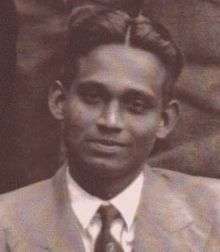C. J. Eliezer
Christie Jayaratnam Eliezer (Tamil: கிரிஸ்டி ஜெயரத்தினம் எலியேசர், romanized: Kirisṭi Jeyarattiṉam Eliyēcar; 12 June 1918 – 10 March 2001) was a Ceylon Tamil mathematician, physicist and academic.
C. J. Eliezer AM FIMA | |
|---|---|
சி. ஜே. எலியேசர் | |
 | |
| Born | 12 June 1918 Navatkuli, Ceylon |
| Died | 10 March 2001 (aged 82) Melbourne, Australia |
| Alma mater | |
| Occupation | Academic |
Early life and family
Eliezer was born on 12 June 1918 in Navatkuli in northern Ceylon.[1][2] He was the son of Jacob Richard Eliezer and Elizabeth Ponnammah Vairakiam.[1] Both of his parents died when he was young.[3] Eliezer was educated at the Wesleyan Mission School, Puloly and Hartley College, Point Pedro (1926–33) where he passed the Cambridge Local Examinations with honours and distinction.[1][3][4] He then spent a year studying at St. Joseph's College, Colombo before joining Ceylon University College in 1935, graduating with a first class honours B.Sc. special degree in mathematics.[1][4][5]
Eliezer married Ranee, daughter of Rev. John Handy.[1] They had five children (Dhamayanthi, Ratna, Anandhi, Renuka and Tamara).[1]
Career
Eliezer worked at Ceylon University College as a visiting lecturer in 1938 before proceeding to Christ's College, Cambridge (1939–43) on a scholarship to study mathematics and theoretical physics.[1][4] He received a first class mathematics tripos from Christ's College in 1941.[1][4] He received a Ph.D. degree from Cambridge in 1946 after producing a thesis, supervised by Paul Dirac, on spinning electron and electromagnetic field.[1][3][4][6][7] Returning to Ceylon Eliezer lectured at the University of Ceylon for a brief period before rejoining Christ's College as a fellow (1946–49).[1][2][4] He received a D.Sc. degree in 1949.[1][7] He was called to the bar at the Middle Temple in 1949.[2][7]
Eliezer was appointed professor of mathematics at University of Ceylon in 1949.[1][2][4] During his ten years at the university he was dean of the Faculty of Science from 1954 to 1957 and deputy pro-vice chancellor in 1955.[1][2][4] Eliezer was a scholar at the Institute for Advanced Study from 1955 to 1956, working with J. Robert Oppenheimer.[4][6] He spent some time at the University of Chicago.[4] Following the passing of the Sinhala Only Act in 1956, Sinhalese nationalists at the University of Ceylon, led by vice-chancellor Nicholas Attygalle and chancellor Dudley Senanayake, attempted to remove Tamil as a medium of instruction at the university but this was thwarted by Eliezer and A. M. A. Azeez, a member of the university's council.[4]
Eliezer was appointed foundation professor of mathematics at the University of Malaya in 1959.[1][2][4] The appointment was only meant be for two years but the deteriorating situation in Ceylon meant that Eliezer decided to stay in Malaya.[4] During his nine years at the university he was dean of the Faculty of Science from 1959 to 1963 and deputy principal and vice-chancellor for another three years.[1][2] Eliezer became the first professor of applied mathematics at La Trobe University in 1968.[1][2][4] During his 15 years at the university he was dean of the School of Physical Sciences (1969–71 and 1982–83) and deputy vice-chancellor for a period.[1][2][4] After retiring in 1983 he was appointed emeritus professor at La Trobe.[1][2][7]
Eliezer had been president of the Ceylon Association for the Advancement of Science.[6] He was a Fellow of the Institute of Mathematics and its Applications.[7] He received an honorary D.Sc.Inf. degree from the University of Jaffna in 1981.[6][7] He was made a Member of the Order of Australia in 1996.[2][4][6] He was awarded the Maamanithar (Great Man) honour by the rebel Liberation Tigers of Tamil Eelam on 19 October 1997.[3][4][6]
Eliezer was vice-president of the Colombo branch of the Young Men’s Christian Association and a member of the Jaffna College board.[1] He was president of the Ceylon Tamil Association of Victoria and chairman of the Australian Federation of Tamil Associations (1984-2001).[1][6] Eliezer helped Tamil refugees fleeing to Australia following the 1983 anti-Tamil Black July riots.[4] He co-hosted a Tamil language programme on the Special Broadcasting Service.[8] Eliezer died on 10 March 2001 in Melbourne.[2][9]
Works
Eliezer wrote several books and articles including:[1][3][4]
- Concise Vector Analysis (1963, Pergamon Press)
- A Modern Text-book on Statics: For Students of Applied Mathematics, Physics and Engineering (1964, Pergamon Press)
- Mathematics : Queen of the Arts, Handmaiden of the Sciences (1969, La Trobe University)
- The First Integrals of Some Differential Equations of Dynamics (1978, La Trobe University)
- Mechanics for Year Eleven (1988, co-author J. G. Barton)
References
- Arumugam, S. (1997). Dictionary of Biography of the Tamils of Ceylon (PDF). p. 52.
- "Eliezer, Christie Jayaratnam (1918 - 2001)". Encyclopedia of Australian Science.
- Sri Kantha, Sachi (14 July 2012). "Christie Jayaratnam Eliezer (1918-2001)". Ilankai Tamil Sangam.
- Senewiratne, Brian (15 April 2001). "Professor C J Eliezer" (PDF). Tamil Times. XX (4): 27–29. ISSN 0266-4488.
- Ceylon University College Prospectus 1936-37 (PDF). Ceylon University College. 1936. p. 43.
- "Christie Jayaratnam Eliezer". Institute for Advanced Study.
- "Emeritus Professors". La Trobe University.
- "Christie Jayaratnam Eliezer (12 June 1918 – 10 March 2001)". Special Broadcasting Service. 9 June 2014.
- "Prof. Eliezer Has Passed Away!". Hartley College.